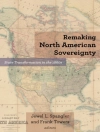This powerful and original book locates the anti-police violence that spread across England in 1980-1 within a longer struggle against racism and disadvantage faced by black Britons, which had seen a growth in more militant forms of resistance since the Second World War. It explains these disturbances as ‘collective bargaining by riot’ – attempts to increase political inclusion by this marginalised group. Through case studies of Bristol, Brixton and Manchester, the book explores the actions of community organisations in the aftermath of disorders. Highlighting the political activities of black Britons and the often-problematic reliance upon ‘official’ sources when forming historical narratives, it demonstrates the contested value awarded to public inquiries – contrastingly viewed by black Britons as either a method for increased political participation or simply a governmental diversionary tactic.
Mục lục
Introduction
1 Resistance to rebellion
2 ‘No other way to make their points of view known’? St Pauls, Bristol, 2 April 1980
3 Lacking conviction: inquiries and trials after Bristol
4 Escalation: Brixton, 10–12 April 1981
5 ‘The Brixton Defence Campaign says boycott the Scarman Inquiry’
6 A ‘conspicuous success’? Policing Liverpool and Manchester in July 1981
7 ‘Who the hell’s defending if they’re going to walk out of here?’ The Moss Side Defence Committee
Epilogue: ‘Turning point’ or ‘opportunity lost’? The legacy of 1980–1
Index
Giới thiệu về tác giả
Simon Peplow is a Senior Teaching Fellow in Twentieth Century British History at the University of Warwick












